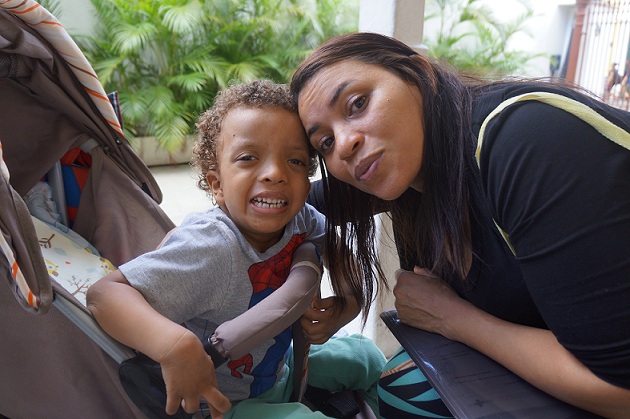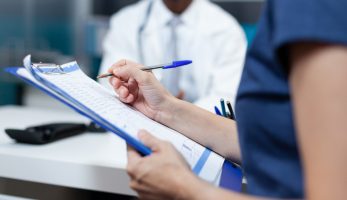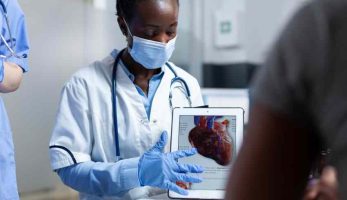Testimony of Fabiana Maria Leonel da Silva, (44).
Mother of Filipe Emanuel Leonel Costa (8)
My son was born with a rare disease called Noonan syndrome, a genetic disorder that prevents normal development in various parts of the body: and that causes difficulty walking and seeing, as well as serious heart problems. The doctor told me and his father in the maternity ward that he would probably not survive. And that if by a miracle he didn’t die, he would be a vegetable confined to bed. This was a terrible shock, no mother is prepared for this kind of news. But my son is alive. With the help of the team at Dara, I realized my son was indeed perfect. I learned to be a better mother, a better friend, and a better human being.
When I first arrived at Dara, in 2018, I thought — I swear — that I had been referred to another hospital, since at that time Filipe went from one to another all the time. He would have crises of arrhythmia and blackout, turning purple. We would take him straight to the UPA close to home, in Rocinha, in the south zone of Rio, to bring him back, and from there we would go by ambulance to a nearby hospital. It was always the same. This time, around he was hospitalized in the Hospital de Laranjeiras when the doctor told us to get in touch with the Dara Institute.
We now know that we were referred because we were experiencing serious financial problems. Filipe’s father and I were capoeira teachers working on a social project in São Conrado. The project suddenly ended and we were both unemployed with no income, surviving with the help of family and friends and unable to afford all the medicines he needed.
Arriving at Dara, they gave me the strength to dream again, because the situation we were in was overwhelming. I will never be able to repay them. I remember that, on the first day, I was coming from another hospital and I hadn’t even had breakfast, and Filipe was hungry as well. They immediately gave us snacks and explained how everything worked. We gratefully accepted everything, it was all manna from heaven.
In the first few months, we received Filipe’s milk and diapers and a card to buy food, which has really alleviated the situation at home. But our main expense was medicines. We spent almost 2,000 reais a month on these, and at that time our income was zero. We got them all with donations through Dara. In addition, we were given guidance on how to apply for government aid, which was a welcome extra source of monthly income.
One day, in 2021, he had an ophthalmological session at the Dara Institute with a team called Ver & Viver. One of Filipe’s main difficulties stopping him from living a normal life was not being able to see properly. Because of the syndrome, he had severe strabismus and could not walk without falling or bumping into things. He couldn’t read very small print either, even though he knew how to read from an early age, and we had to read almost everything to him. He could only watch TV from up close and his vision problem caused bad headaches. During the session, he was examined by ophthalmologists and referred to a specialist in strabismus, a strabologist, at Pedro Ernesto hospital.
There, the doctor said that his case would need surgery, but that it would be life-threatening. In view of this, he chose to indicate eye exercises to alleviate the effects of the syndrome and – the most important thing – prescribed corrective glasses. As we didn’t have the money for these, a partner eyewear company, which was in the collective, gave him a pair of glasses. The change was amazing.
He started to read and write more, he stopped falling, and, because of that, he can walk for much longer. “Mom, I have beautiful eyes!” he told me. Filipe is an artist, and my pride and joy. He’s a rapper as well — and has already won first prize in a rhyming battle! — and has even written a book, which the school has published. He also loves to dance, and I think the inspiration for this came from his capoeirista parents, of this I am certain!
We talk a lot about material things, help with diapers, medicine, and food, but the most precious thing I will take from Dara are the talks we had there in the conversation circles at Aconchego. That’s what really changed my relationship with Filipe.
When you have a child with special needs, sometimes the question comes up: why? And I sometimes thought this. I learned over time, listening to the lectures and the words of psychologists. This dialogue helped our relationship grow as did our love for each other.
Even my health was positively affected! Even though I was an athlete, teaching capoeira, I didn’t eat right and, because of that, I had very high blood pressure. I thought it was because I didn’t have the money to buy good food, that what I had was only enough for canned goods, sausages, instant noodles, and food made with oil or butter. But this was not true. I just didn’t know how to eat properly. Dara’s nutritionists taught me how to eat better, and this improved the whole family’s diet. I learned to eat fruits, vegetables, and salads in general, and there is no longer canned or processed food at home.
Filipe’s father and I are now back at work, thank God, and whenever I can, I pass on everything I learned to my students and their parents. There is so much good we have to share, right?




